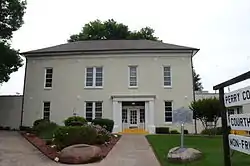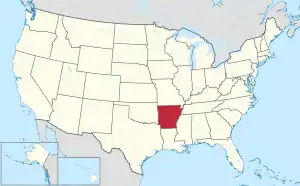Perry County, Arkansas
Perry County is a county located in the U.S. state of Arkansas. Its population was 10,019 at the 2020 United States Census.[1] The county seat is Perryville.[2] The county was formed on December 18, 1840, and named for Commodore Oliver Hazard Perry, naval hero in the War of 1812. It is an alcohol prohibition or dry county.
Perry County | |
|---|---|
 | |
 Location within the U.S. state of Arkansas | |
 Arkansas's location within the U.S. | |
| Coordinates: 34°57′37″N 92°56′07″W | |
| Country | |
| State | |
| Founded | December 18, 1840 |
| Named for | Oliver Hazard Perry |
| Seat | Perryville |
| Largest city | Perryville |
| Area | |
| • Total | 561 sq mi (1,450 km2) |
| • Land | 551 sq mi (1,430 km2) |
| • Water | 9.1 sq mi (24 km2) 1.6% |
| Population (2020) | |
| • Total | 10,019 |
| • Density | 18/sq mi (6.9/km2) |
| Time zone | UTC−6 (Central) |
| • Summer (DST) | UTC−5 (CDT) |
| Congressional district | 2nd |
| Website | perrycoarkansas |
Perry County is included in the Little Rock–North Little Rock–Conway, AR Metropolitan Statistical Area.
Geography
According to the U.S. Census Bureau, the county has a total area of 561 square miles (1,450 km2), of which 551 square miles (1,430 km2) is land and 9.1 square miles (24 km2) (1.6%) is water.[3] It is the fourth-smallest county in Arkansas by land area and third-smallest by total area.
Major highways
Adjacent counties
- Conway County (north)
- Faulkner County (northeast)
- Pulaski County (east)
- Saline County (southeast)
- Garland County (southwest)
- Yell County (west)
National protected area
- Ouachita National Forest (part)
Demographics
| Census | Pop. | Note | %± |
|---|---|---|---|
| 1850 | 978 | — | |
| 1860 | 2,465 | 152.0% | |
| 1870 | 2,685 | 8.9% | |
| 1880 | 3,872 | 44.2% | |
| 1890 | 5,538 | 43.0% | |
| 1900 | 7,294 | 31.7% | |
| 1910 | 9,402 | 28.9% | |
| 1920 | 9,905 | 5.3% | |
| 1930 | 7,695 | −22.3% | |
| 1940 | 8,392 | 9.1% | |
| 1950 | 5,978 | −28.8% | |
| 1960 | 4,927 | −17.6% | |
| 1970 | 5,634 | 14.3% | |
| 1980 | 7,266 | 29.0% | |
| 1990 | 7,969 | 9.7% | |
| 2000 | 10,209 | 28.1% | |
| 2010 | 10,445 | 2.3% | |
| 2020 | 10,019 | −4.1% | |
| U.S. Decennial Census[4] 1790–1960[5] 1900–1990[6] 1990–2000[7] 2010[8] | |||

2020 census
| Race | Number | Percentage |
|---|---|---|
| White (non-Hispanic) | 9,069 | 90.52% |
| Black or African American (non-Hispanic) | 107 | 1.07% |
| Native American | 43 | 0.43% |
| Asian | 12 | 0.12% |
| Other/Mixed | 502 | 5.01% |
| Hispanic or Latino | 286 | 2.85% |
As of the 2020 United States census, there were 10,019 people, 3,668 households, and 2,824 families residing in the county.
2000 census
As of the 2000 census,[11] there were 10,209 people, 3,989 households, and 2,939 families residing in the county. The population density was 18 people per square mile (6.9 people/km2). There were 4,702 housing units at an average density of 8 units per square mile (3.1 units/km2). The racial makeup of the county was 95.62% White, 1.73% Black or African American, 0.98% Native American, 0.15% Asian, 0.02% Pacific Islander, 0.39% from other races, and 1.11% from two or more races. 1.18% of the population were Hispanic or Latino of any race.
There were 3,989 households, out of which 32.60% had children under the age of 18 living with them, 61.10% were married couples living together, 8.70% had a female householder with no husband present, and 26.30% were non-families. 23.20% of all households were made up of individuals, and 10.40% had someone living alone who was 65 years of age or older. The average household size was 2.52 and the average family size was 2.96.
In the county, the population was spread out, with 25.30% under the age of 18, 7.40% from 18 to 24, 28.00% from 25 to 44, 24.50% from 45 to 64, and 14.80% who were 65 years of age or older. The median age was 38 years. For every 100 females, there were 98.30 males. For every 100 females age 18 and over, there were 96.20 males.
The median income for a household in the county was $31,083, and the median income for a family was $37,170. Males had a median income of $28,254 versus $21,462 for females. The per capita income for the county was $16,216. About 10.50% of families and 14.00% of the population were below the poverty line, including 17.00% of those under age 18 and 15.00% of those age 65 or over.
Government
Over the past few election cycles Perry County has trended heavily towards the GOP. The last Democrat (as of 2020) to carry this county was Bill Clinton in 1996.
| Year | Republican | Democratic | Third party | |||
|---|---|---|---|---|---|---|
| No. | % | No. | % | No. | % | |
| 2020 | 3,479 | 75.19% | 1,012 | 21.87% | 136 | 2.94% |
| 2016 | 3,008 | 69.86% | 1,049 | 24.36% | 249 | 5.78% |
| 2012 | 2,581 | 65.54% | 1,187 | 30.14% | 170 | 4.32% |
| 2008 | 2,743 | 64.10% | 1,352 | 31.60% | 184 | 4.30% |
| 2004 | 2,435 | 54.95% | 1,921 | 43.35% | 75 | 1.69% |
| 2000 | 2,114 | 52.76% | 1,648 | 41.13% | 245 | 6.11% |
| 1996 | 1,143 | 32.83% | 1,873 | 53.79% | 466 | 13.38% |
| 1992 | 1,162 | 33.16% | 1,906 | 54.39% | 436 | 12.44% |
| 1988 | 1,627 | 52.01% | 1,470 | 46.99% | 31 | 0.99% |
| 1984 | 2,047 | 58.82% | 1,404 | 40.34% | 29 | 0.83% |
| 1980 | 1,459 | 45.79% | 1,606 | 50.41% | 121 | 3.80% |
| 1976 | 832 | 26.48% | 2,310 | 73.52% | 0 | 0.00% |
| 1972 | 1,445 | 63.88% | 810 | 35.81% | 7 | 0.31% |
| 1968 | 740 | 32.31% | 634 | 27.69% | 916 | 40.00% |
| 1964 | 1,048 | 43.90% | 1,320 | 55.30% | 19 | 0.80% |
| 1960 | 501 | 36.17% | 789 | 56.97% | 95 | 6.86% |
| 1956 | 572 | 43.87% | 719 | 55.14% | 13 | 1.00% |
| 1952 | 502 | 38.32% | 802 | 61.22% | 6 | 0.46% |
| 1948 | 201 | 18.42% | 731 | 67.00% | 159 | 14.57% |
| 1944 | 285 | 28.64% | 710 | 71.36% | 0 | 0.00% |
| 1940 | 206 | 20.81% | 783 | 79.09% | 1 | 0.10% |
| 1936 | 249 | 21.69% | 899 | 78.31% | 0 | 0.00% |
| 1932 | 123 | 8.34% | 1,347 | 91.38% | 4 | 0.27% |
| 1928 | 474 | 42.59% | 636 | 57.14% | 3 | 0.27% |
| 1924 | 260 | 32.91% | 386 | 48.86% | 144 | 18.23% |
| 1920 | 592 | 43.31% | 738 | 53.99% | 37 | 2.71% |
| 1916 | 439 | 31.05% | 975 | 68.95% | 0 | 0.00% |
| 1912 | 163 | 16.89% | 522 | 54.09% | 280 | 29.02% |
| 1908 | 445 | 39.63% | 608 | 54.14% | 70 | 6.23% |
| 1904 | 356 | 41.40% | 477 | 55.47% | 27 | 3.14% |
| 1900 | 293 | 38.45% | 459 | 60.24% | 10 | 1.31% |
| 1896 | 217 | 24.08% | 678 | 75.25% | 6 | 0.67% |
Tourism
Perry County is known for its Fourche River Days Festival held each year in April which includes a Car, Truck, & Motorcycle show, Live music, Vendors and children's activities.[13] Perry County is also known for its annual Goat Festival[14] held in the Fall drawing thousands of tourists from around the country. Perry County is also the location of Heifer Ranch, an arm of Heifer International, a nonprofit which provides food and agricultural training for people all across the globe.
Communities
Cities
- Adona
- Perryville (county seat)
Census-designated places
Other unincorporated communities
Townships
Townships in Arkansas are the divisions of a county. Each township includes unincorporated areas; some may have incorporated cities or towns within part of their boundaries. Arkansas townships have limited purposes in modern times. However, the United States census does list Arkansas population based on townships (sometimes referred to as "county subdivisions" or "minor civil divisions"). Townships are also of value for historical purposes in terms of genealogical research. Each town or city is within one or more townships in an Arkansas county based on census maps and publications. The townships of Perry County are listed below; listed in parentheses are the cities, towns, and/or census-designated places that are fully or partially inside the township. [15][16]
- Aplin
- Casa (Casa)
- Cherry Hill
- Fourche Lafavre (most of Perryville)
- Houston (Houston)
- Kenney
- Lake (Perry)
- Maumelle
- New Tennessee
- Perry (Bigelow, Fourche)
- Petit Jean (Adona)
- Rankin
- Rose Creek
- Tyler
- Union
- Union Valley (small part of Perryville)
- Wye
Notable people
- Mary Elizabeth Bentley (born 1961), Republican member of the Arkansas House of Representatives since 2015
- Len E. Blaylock (1918-2012), Republican politician from Nimrod in Perry County
- Bob Dorough (1923-2018), American bebop and jazz pianist most recognizable from Schoolhouse Rock! fame.
See also
References
- "Census - Geography Profile: Perry County, Arkansas". United States Census Bureau. Retrieved January 21, 2023.
- "Find a County". National Association of Counties. Retrieved June 7, 2011.
- "2010 Census Gazetteer Files". United States Census Bureau. August 22, 2012. Retrieved August 27, 2015.
- "U.S. Decennial Census". United States Census Bureau. Retrieved August 27, 2015.
- "Historical Census Browser". University of Virginia Library. Retrieved August 27, 2015.
- Forstall, Richard L., ed. (March 27, 1995). "Population of Counties by Decennial Census: 1900 to 1990". United States Census Bureau. Retrieved August 27, 2015.
- "Census 2000 PHC-T-4. Ranking Tables for Counties: 1990 and 2000" (PDF). United States Census Bureau. April 2, 2001. Archived (PDF) from the original on March 27, 2010. Retrieved August 27, 2015.
- "State & County QuickFacts". United States Census Bureau. Archived from the original on June 7, 2011. Retrieved May 19, 2014.
- Based on 2000 census data
- "Explore Census Data". data.census.gov. Retrieved December 31, 2021.
- "U.S. Census website". United States Census Bureau. Retrieved May 14, 2011.
- "Dave Leip's Atlas of U.S. Presidential Elections". Retrieved November 18, 2016.
- "Fourche River Days". fourcheriverdays.com. Archived from the original on March 20, 2015. Retrieved July 17, 2023.
- "Whoops, it looks like that event has passed or is no longer happening. | Arkansas.com". www.arkansas.com.
- 2011 Boundary and Annexation Survey (BAS): Perry County, AR (PDF) (Map). U. S. Census Bureau. Archived from the original (PDF) on October 19, 2012. Retrieved August 24, 2011.
- "Arkansas: 2010 Census Block Maps - County Subdivision". United States Census Bureau. Retrieved May 29, 2014.